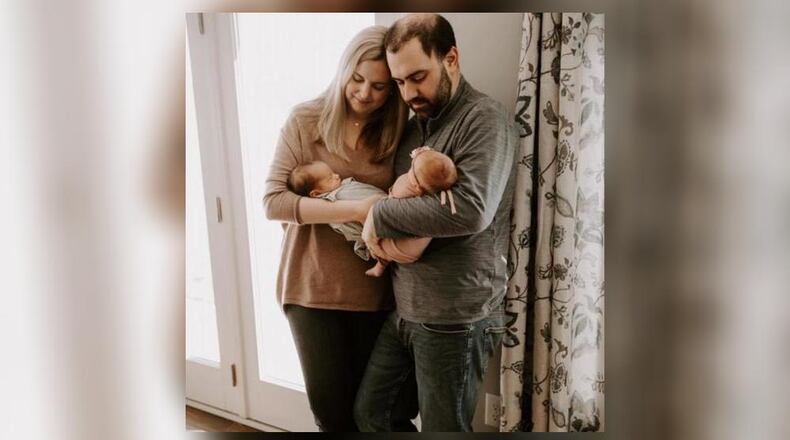The twins had their first well visit with their pediatrician, Dr. Randy Eisenhut, in Centerville before schools, stores and restaurants across the state closed with Gov. Mike DeWine’s stay-at-home order. They had their second well visit in April under different circumstances.
“Everyone had masks on, so that was different,” Williams said. “They screened us before we came in. We called when we got there. They asked us some questions about how we were feeling: if we had been sick, if the babies had been sick, if we had a temperature. My husband (Brad) and I luckily both got to go because we have two babies, but otherwise only one of us could have gone. We waited in the parking lot until they were ready for us.”
Parents and pediatricians have adapted to that kind of new normal this spring. Williams didn’t debate whether to take her infants to their well visits, but many parents have cancelled their visits or postponed them out of fear of exposing their kids to COVID-19.
Dr. Silvia Parks, of South Dayton Pediatrics, said well visits are down 50 percent at her practice. It’s an issue across the state, and Dr. Amy Acton, director of the Ohio Department of Health, addressed it April 28 during a press conference with Gov. Mike DeWine.
“We know that the threat of coronavirus is very scary, “Acton said, “but we need you to continue to take your children to their well-child visits. Canceling these visits could increase your child’s risk for measles, whooping cough and other life-threatening illnesses.”
» THE FRONT LINE: Local ER doctor talks about how job has changed
Parks and other local pediatricians at first focused on making sure the youngest children — birth to 18 months — kept coming in for their well visits because keeping on schedule with immunization shots is so important. Postponing appointments was less of a problem with older kids who don’t have developmental concerns, and often those visits can be conducted via telehealth — video or phone checkups.
Now pediatricians are trying to get everyone back on a normal schedule because there’s no telling how long the pandemic will last.
“Of course, people are scared,” Parks said, “so we’re trying to reassure them. We’re only seeing well child checks in the mornings and sick visits in the afternoons mostly.”
Williams trusted her pediatrician was doing everything possible to keep the office clean and everyone healthy.
“I think the good outweighed the risk,” she said. “We wanted to make sure that they obviously got their vaccines. To me as a first-time mom, it was important for our pediatrician to just see them and lay eyes on them and make sure that they were healthy and tell me that everything looked good.”
» MORE COVERAGE: How respiratory therapists are leading the fight against COVID-19?
Dr. Greg Eberhart, of Cornerstone Pediatrics in Springboro, filmed a video on Facebook to update his patients and their families on what the practice is doing to keep them safe.
“More than anything else, we don’t want to bring kids into an environment that puts them at any risk,” Eberhart said, “and so I think early on a lot of practices did this just by changing the physical space and by scheduling changes. Five or or six weeks ago, we split our office in half. Half the offices are for well visits, and half the offices are for sick visits. No sick kids go in half of our physical space, and our space thankfully is kind of split that way. It was really easy to do. We’ve done the same with our waiting room. We have a sick waiting room and a well waiting room.”
Like South Dayton Pediatrics, Cornerstone is only conducting well visits in the morning. They have done the well visits for the youngest kids throughout the pandemic and have started in the last week bringing back older kids for well visits.
» MOVING ONLINE: Speech therapists adapt in Dayton
“If you need your kindergarten physical or your soccer physical or your cheerleading physical or whatever it may be,” Eberhart said, “the American Academy of Pediatrics just last week kind of said, ‘Let’s roll. Let’s get those kids back in there.’”
The well visits give doctors a chance to assess the mental health of the patients as well as the physical health, Eberhart said, which is especially important at this time because kids aren’t seeing their friends as much or participating in extracurricular activities.
While this is a challenging time for families, it is difficult in a different way for many pediatricians in the Dayton area. They are suffering financially because they are seeing fewer patients.
Kim Grant, executive director for Dayton Children’s Health Partners, said most pediatricians in the area have independent practices. They are essentially small businesses and are struggling like many small business around the area.
» LOCAL CONNECTIONS: Oakwood, Fairmont grads working at epicenter of crisis
About half of the practices in the area have applied for Small Business Administration loans, Eberhart said. His practice did not receive a loan the first time around but is hopeful it will receive one in the second round of loans. Cornerstone has adapted by asking its part-time staff to work fewer hours. He said they’re hanging in there, but it’s not a long-term sustainable model.
Kathi Ely, the practice manager at Child & Adolescent Specialty Care in Tipp City, said the practice has three doctors and five nurses, and two of those nurses took voluntary leave. It cut its weekly hours from 60 to 20 and hopes to get help from the Payroll Protection Program.
“We just started having some providers off,” Ely said, “and I made up a schedule where not everybody was working every day. We decided to do whatever everybody is doing: well checks in the morning and sick kids in the afternoon. We did some telehealth, but we just didn’t have any people calling with children needing to come in because they were ill, so we’ve been closing at noon every day.”
About the Author

